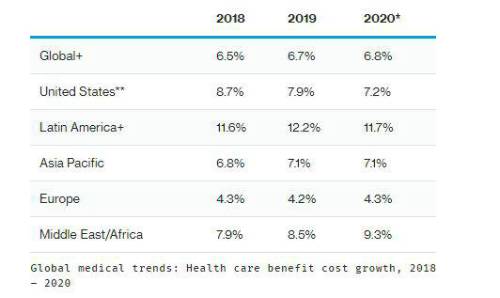Employer-sponsored health care benefit cost increases are expected to vary widely around the globe in 2020, according to a survey of medical insurers by Willis Towers Watson (NASDAQ: WLTW), a leading global advisory, broking and solutions company. The survey found mental health conditions are expected to become one of the most significant cost factors over the next five years.
The 2020 Global Medical Trends Survey, the largest of its kind, found medical insurers globally are projecting health care benefit costs to continue to rise across the world in 2020. Average increases in the five regions will range from 4.3% in Europe to 11.7% in Latin America.
The study also found that 40% of all respondents expect medical costs will continue to increase at a higher rate over the next three years. Asia Pacific insurers are the most optimistic, with 32% agreeing there will be a moderate increase over the next three years, while 12% believe costs will be lower. Conversely, more than half (54%) of Middle East and Africa insurers believe medical expenses will increase, and virtually none anticipate lower costs.

*Projected
**U.S. data are from various years of the Willis Towers Watson National Trend Survey.
+Due to the hyperinflationary nature of the Venezuelan economy, Venezuela has been excluded from Latin America regional and global totals. Including Venezuela, the 2020 global average trends would be 7.2%, and Latin American average trends would be 14.8%.
"Controlling rising health care benefit costs remains a top priority for medical insurers and employers globally,” said Cecil Hemingway, managing director and global co-head of Health and Benefits, Willis Towers Watson. "Despite the regional variation, cost increases continue to outpace inflation and remain unsustainable, making affordability a challenge for employers and employees alike. Employers that take steps now to understand the factors driving up costs and evaluate how they deliver health care benefits will be better positioned to manage costs in the years ahead."
According to the survey, more than a quarter of insurers (27%) are predicting that mental health conditions will be among the three most common conditions affecting costs within the next five years, while 26% predict these conditions will be among the most expensive. Currently, cancer (83%), cardiovascular diseases (55%), and conditions affecting musculoskeletal and connective tissue (46%) are the top three conditions by cost and are expected to remain so in the near future.
When asked for the most significant cost-driving factors outside the control of employers and vendors, seven in 10 respondents (70%) cited the high cost of medical technology, followed by providers' profit motives (47%). Interestingly, nearly three in four insurers (73%) ranked overuse of care due to medical practitioners recommending too many services as the most significant factor driving costs related to employee and provider behavior. Two-thirds (66%) cited overuse of care due to employees seeking inappropriate care. Both figures represent an increase from 2019.
"The potential impact of mental health conditions is getting the attention of insurers and employers worldwide. As the demand for mental health services increases, employers can expect upward pressure on costs and challenges to existing health care models," said Francis Coleman, managing director, Health and Benefits, Global Services and Solutions, Willis Towers Watson.
|

